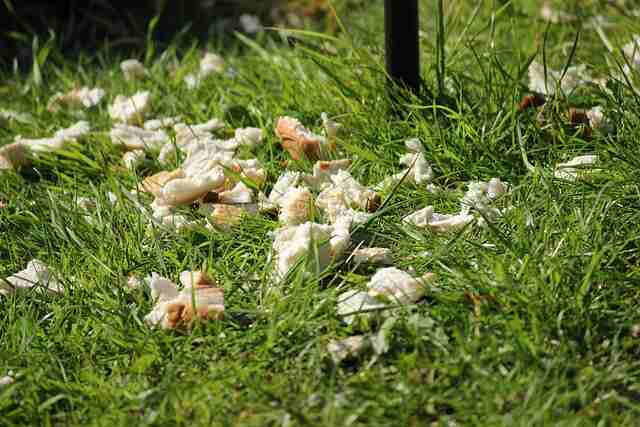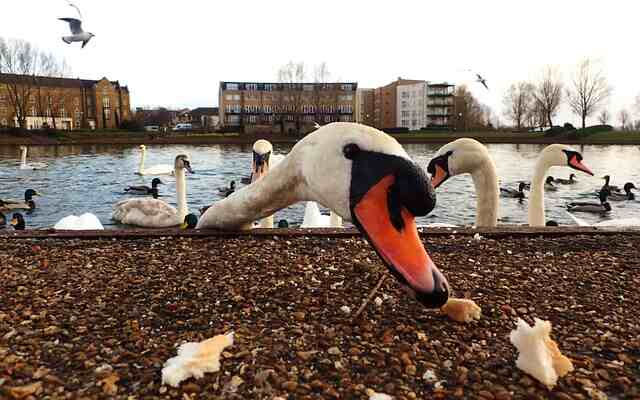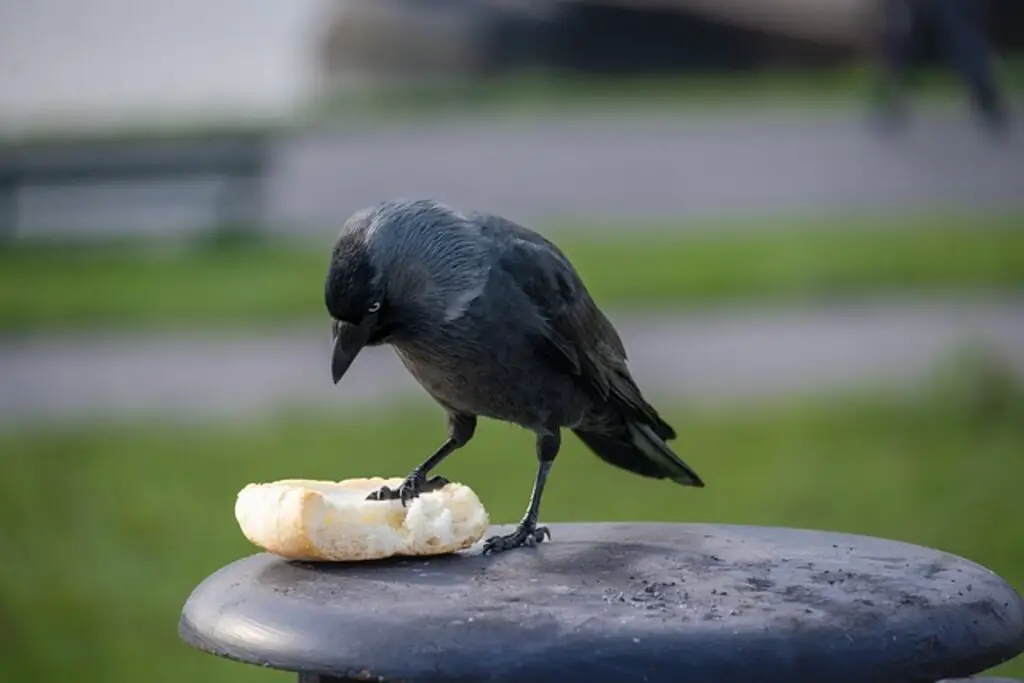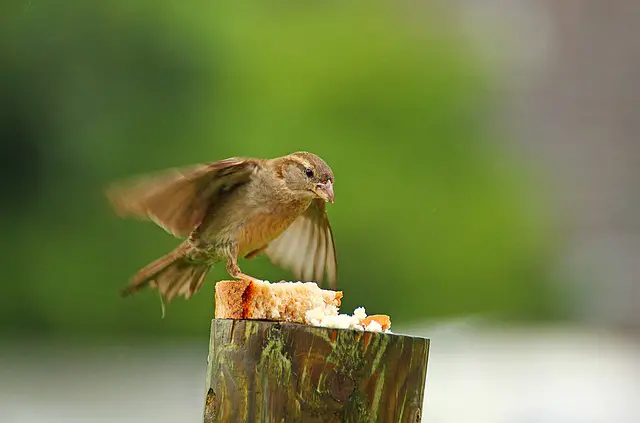Do you ever find yourself with extra bread that’s growing a bit stale? We’ve all been there. But is it still safe for your feathered friends, or could it be dangerous to feed them moldy bread? In this post, we’ll explore the answer to “Can birds eat moldy bread?”
We’ll look at why birds love snackin’ on grains, the possible contaminants of moldy bread, and the potential risks associated with it, so you can make an informed decision about what to do with bread past its expiration date.
Table of Contents
- 1 Can birds eat moldy bread?
- 2 Is moldy bread safe for birds?
- 3 Can wild birds eat moldy bread?
- 4 Can birds get sick from moldy bread?
- 5 What happens if a bird eats moldy bread?
- 6 What happens if a bird eats mold?
- 7 Can birds eat stale bread?
- 8 Does moldy bread kill birds?
- 9 How poisonous is bread mold to birds?
- 10 Can seagulls eat moldy bread?
- 11 Can crows eat moldy bread?
- 12 Is it okay to feed moldy bread to ducks?
- 13 Can chickens eat moldy bread?
- 14 Can birds and squirrels eat moldy bread?
- 15 Can birds eat bread with mold on it?
- 16 Can birds eat bread that has started to mold?
- 17 Author
Can birds eat moldy bread?
Moldy bread is not a safe food for birds to eat as it can cause health issues. Mold grows on bread when there is too much moisture and warmth, making the bread unsafe to consume.
When birds ingest moldy bread, they can suffer from poisoning due to mycotoxins contained in the mold. These toxins can lead to issues such as digestive problems, weakness, depression and even death if left untreated.
To be safe, bird owners should avoid feeding their feathered friends any type of moldy food item, including moldy bread. By doing this, they will ensure that their pet birds remain healthy and happy.
Is moldy bread safe for birds?
Moldy bread is a potential health hazard for birds as it can contain toxic fungi and mycotoxins. These toxins, when ingested or inhaled by the bird, can cause respiratory, neurological and digestive problems which in turn can be fatal.
Moldy bread also affects the bird’s immune system by suppressing its ability to fight off disease causing bacteria. Feeding moldy bread to birds can quickly lead to malnutrition due to loss of appetite and nutrients from decaying food.
As such, it is highly recommended that you avoid feeding any type of moldy bread to your feathered friends. Instead, opt for fresh foods like fruits, vegetables and grains as these are much healthier options for them.
Can wild birds eat moldy bread?
Wild birds may be tempted to eat moldy bread, particularly during winter, when food sources are scarce. However, bread, either fresh or stale, provides no real nutritional value for birds and can have a detrimental effect on their health. Eating moldy bread can lead to mycotoxicosis, an illness caused by the ingestion of toxic substances produced by molds that grow on decomposing organic material.
Mycotoxicosis is characterized by weakness, lethargy, disorientation, respiratory distress and even death in extreme cases. Therefore, while it may seem kind to feed bread to wild birds, it is actually more beneficial to provide them with appropriate birdseed or mealworms.
Can birds get sick from moldy bread?
Moldy bread can be a health hazard for birds, as it can contain mycotoxins that could potentially make them ill. Mycotoxins are toxins produced by certain types of mold and fungus, which can be found on bread that has gone bad or been stored improperly.
Ingesting these toxins can cause respiratory issues and other illnesses in birds, depending on the type of toxin and how much was ingested. It is important to always keep bird feeders stocked with fresh food and to discard any old or moldy bread immediately to avoid potential harm to your feathered friends.
What happens if a bird eats moldy bread?
Moldy bread can be dangerous for birds if ingested. Ingesting moldy bread can cause a variety of health problems, including fungal infections, liver problems, and gastrointestinal distress. These symptoms can lead to significant weight loss in the bird, as well as difficulty digesting food. In severe cases, it may even result in death.
Birds have sensitive digestive systems that cannot handle eating contaminated foods like moldy bread. It is important to never feed them this type of food because it can make them very ill or even kill them. If you see any signs of illness in your pet bird after they’ve eaten moldy bread, seek veterinary treatment immediately.
What happens if a bird eats mold?
Eating mold can be hazardous to birds, just as it is for humans. Eating even a small amount of mold can cause respiratory problems, digestive issues, and infections. In birds, consuming mold may lead to impaired breathing or death. Additionally, certain kinds of molds contain toxins and spores which can affect the bird’s liver and other organs.
The toxins and spores can also spread through the bird’s bloodstream, leading to fatigue, fever, blurred vision, and other symptoms. If a bird consumes more than a tiny amount of mold, it should be taken to an avian veterinarian immediately for treatment.
Prevention is the best way to ensure a bird’s health; always keep their food fresh and throw out anything that has started to grow any kind of mold.
Can birds eat stale bread?
Birds can ingest stale bread, however, it is not advisable. Stale bread does not provide proper nutrition for birds and can even be hazardous to their health. If a bird’s diet consists of mostly bread, they may become malnourished, particularly during the winter months, when food sources are scarce.
Additionally, moldy and stale bread can cause Aspergillosis, a lung infection that affects both wild and pet birds. Therefore, it is best to avoid feeding your feathered friends with any type of stale or moldy bread, as this could lead to serious health complications.
Does moldy bread kill birds?
Mold can produce a neurotoxin called tremorgenic mycotoxin, which affects the nervous system of birds and mammals. The toxin can cause seizures, convulsions, and even death. Additionally, moldy bread products can also contain salmonella bacteria.
Salmonella is an infection-causing bacteria that can be deadly for birds and other animals if ingested in large quantities. For this reason, it’s important not to feed birds moldy or contaminated food of any kind.
Keep bird feeders clean, offer only fresh foods, and dispose of leftovers properly to keep our feathered friends safe from harm.

How poisonous is bread mold to birds?
Bread mold can be extremely harmful to birds. It contains toxins known as mycotoxins that can cause organ failure, inflammation, and gastrointestinal issues. These effects are much more severe in smaller animals like birds and can quickly lead to death if they have been exposed for a prolonged period of time.
Furthermore, the spores from bread mold may also cause respiratory problems in birds, leading to difficulty breathing and eventually death. For this reason, it is important to keep any areas where birds frequent free from moldy bread or other forms of food with molds present.
Can seagulls eat moldy bread?
Seagulls can eat moldy bread, but it is not recommended. Mold can be very dangerous to birds and their health due to the presence of mycotoxins that are released by the mold’s spores. These toxins can damage a seagull’s organs and reduce their life span if they consume enough of them.
Additionally, pieces of bread that are too large to swallow can cause a blockage in the digestive tract, which could be lethal for the bird. Therefore, when feeding seagulls, avoid feeding them bread, but if decide to, it is important to ensure that the bread is fresh and free from mold before giving it to them.
Can crows eat moldy bread?
Moldy bread can be dangerous for crows and other birds. Mold is a type of fungus that can grow on food, causing it to become discolored or even fuzzy. If eaten, moldy bread can make a bird sick because it contains toxins. In some cases, the toxins can cause severe health issues such as difficulty breathing, organ damage and even death.
Even though some birds may eat moldy bread due to lack of food sources, it’s not recommended since they could suffer from the side effects. It’s better for them to find healthy sources of food that won’t put their lives in danger.
Is it okay to feed moldy bread to ducks?
It is not recommended to feed moldy bread to ducks. Although ducks may seem to enjoy the treat, it can be very dangerous for their health. Moldy bread can contain a fungal infection called aspergillosis which can be deadly to an entire flock of ducks.
Aspergillosis causes severe respiratory issues such as coughing, and difficulty breathing, which can ultimately lead to death. In addition to this, moldy bread contains toxins that are harmful when digested by birds.
The safest option is to avoid feeding the ducks any kind of moldy or stale food, and instead give them healthy treats like worms or cooked rice.

Can chickens eat moldy bread?
Moldy bread should be off-limits to chickens. Mold can contain toxins that can harm your feathered friends, so it’s best to discard any moldy food before you give it to them. Even if the mold is not visible, the toxins may have spread from the original infected area and could still affect your chickens.
If a chicken does eat moldy bread, they could experience digestive issues such as vomiting and diarrhea. Additionally, animals fed moldy food may develop breathing problems or neurological issues due to mycotoxins released by some kinds of molds.
To keep your chickens safe, check for spoilage before giving them anything, and always discard any foods with visible signs of mold growth.
Can birds and squirrels eat moldy bread?
Birds and squirrels should never eat moldy bread. Moldy food can contain tremorgenic mycotoxins which are a type of toxin that is produced by certain species of mold when they grow on foods. These mycotoxins can make both wildlife and our pets very sick if ingested.
Symptoms in animals include seizures, vomiting, and even death if too much is consumed. Therefore, it’s best to avoid feeding moldy bread to birds and squirrels, as the potential harm outweighs any benefit.
Can birds eat bread with mold on it?
Mold is not something that birds can safely consume. If bread has been left out for an extended time, it is highly likely to have mold on it. Eating moldy bread can cause sickness or even death in birds, as they are particularly vulnerable to fungal infections found in decaying food items.
It is best to throw out any bread with visible signs of mold and provide birds with fresh and safe food alternatives such as seeds and nuts.
Can birds eat bread that has started to mold?
Birds should not consume bread that has already started to mold. It is dangerous for them and can cause a number of health issues. Mold releases toxins into the food, which can be very harmful when consumed by birds.
Eating large chunks of moldy bread can even potentially block their digestive tract. It’s best for bird owners to check their feeders regularly and either throw out any moldy food or switch it with fresh, healthy alternatives.
Related Post:



